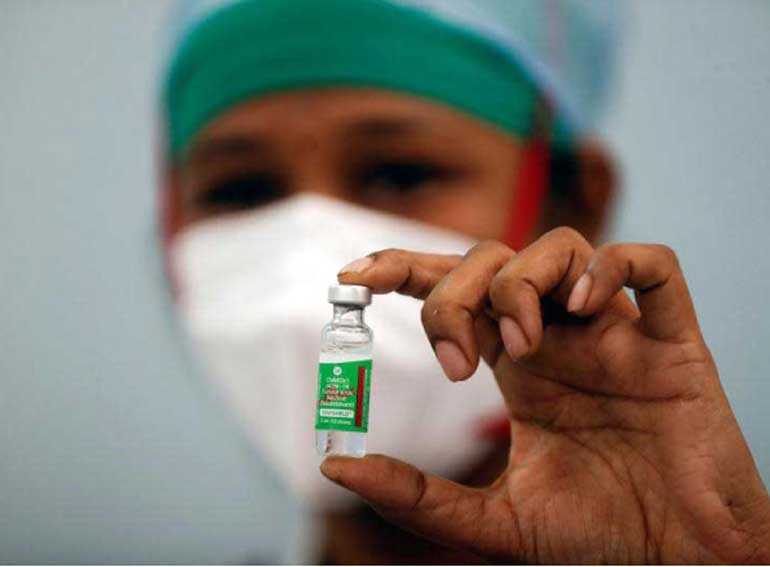Tuesday Feb 24, 2026
Tuesday Feb 24, 2026
Saturday, 23 January 2021 00:01 - - {{hitsCtrl.values.hits}}

Sri Lanka has become the latest country to approve the Oxford AstraZeneca vaccine
By Shailendree Wickrama Adittiya
The National Medicines Regulatory Authority (NMRA) yesterday approved the use of the Oxford-AstraZeneca vaccine against COVID-19 in emergency situations, and health authorities are expecting to receive the first batch of the vaccine from India.
While the relevant documents for legal clearance have been handed over to the Attorney General by Director General of Health Services Dr. Asela Gunawardena, clarifications on the agreement with India have been sought by Attorney General Dappula de Livera, Coordinating Officer to the Attorney General State Counsel Nishara Jayaratne confirmed yesterday.
According to NMRA CEO Dr. Kamal Jayasinghe, the vaccine can now be brought down to the country and the first batch is expected as a grant from the Indian government.
“This vaccine has been approved by the Medicines and Healthcare Products Regulatory Agency of the United Kingdom for use in emergency situations. It is based on this as well as recommendations from our expert committees that we give our approval,” Dr. Jayasinghe said.
He explained that the vaccine did not have any severe side effects and was 80% effective.
Production, Supply and Regulation of Pharmaceuticals State Minister Channa Jayasumana also confirmed the vaccine had received approval from NMRA for use in emergency situations. “We think that very soon we will have the opportunity to use the vaccine in the country. This is the first time a COVID-19 vaccine received approval for usage in the country,” he said.
Jayasumana, too, stated that the first batch will be received through a grant.
Meanwhile, the High Commission of India in Sri Lanka yesterday tweeted: “Welcome emergency use approval of COVISHIELD vaccines by Government of Sri Lanka. This clears the way for scheduling delivery of the vaccine from #India to #lka.” The High Commission also said Government authorities in India and Sri Lanka were now working towards early delivery of vaccines to Sri Lanka.
Free shipments of AstraZeneca’s vaccine manufactured by the Serum Institute of India, the world’s biggest producer of vaccines, have begun arriving in the Maldives, Bhutan, Bangladesh and Nepal. Myanmar and the Seychelles are next in line to get free consignments as India uses its strength as one of the world’s biggest makers of generic drugs to build friendships.
Sri Lanka requested vaccines when Indian External Affairs Minister S. Jaishankar visited Colombo for a three-day visit earlier this month. China has also reportedly offered vaccines after a letter from President Gotabaya Rajapaksa.
In terms of the preparations made within the country for the use of the vaccine, a trial will be carried out at the Piliyandala Medical Officer of Health, Piliyandala Regional Hospital, and the Colombo North Teaching Hospital-Ragama today in order to identify and solve any issues with the process.
The trial will also give health authorities an idea of how many vaccines can be administered in an hour, Deputy Director General of Public Health Services Dr. Hemantha Herath said yesterday.
“The Health Ministry has decided to distribute the first doses of the vaccine to healthcare workers and frontline workers in different units. When we receive a vaccine in the future, preparations have been made to give it to these groups immediately,” Dr. Herath added.
He explained that all preparations have been made for the administration of the vaccine, adding that the Health Ministry is currently fine-tuning and improving the process of storage and distribution.
Meanwhile, the Government Medical Officers’ Association (GMOA) in a statement issued yesterday stated that priority should be given to frontline health workers when distributing the COVID-19 vaccine in the country.
They explained that a significant number of healthcare providers in hospitals and medical centres have tested positive for COVID-19 and that a continuation of this could put serious limitations on the human resources of the healthcare system.
The GMOA listed five factors to consider when bringing down a vaccine to the country. These include a vaccine approved by the World Health Organisation (WHO) that is highly effective, has minimal side effects, suits the country’s physical environment, and is affordable.